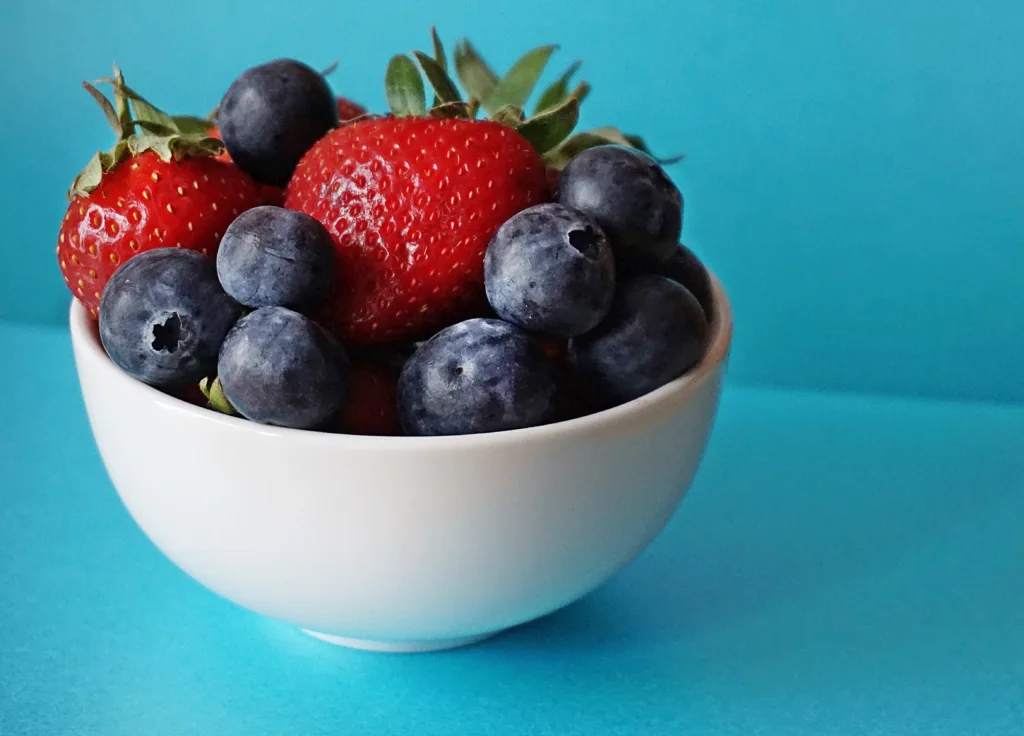Are you looking for a snack that is low FODMAP, but also delicious and satisfying? If so, look no further than blackberry! Blackberries are a great addition to anyone’s diet looking to reduce their FODMAP intake. In this article, we will explore why blackberries are low FODMAP, how to incorporate them into your diet and how to choose the best ones. With this information, you will be able to enjoy the benefits of low FODMAP blackberries without compromising on flavor or nutrition.
Blackberry is a line of smartphones, tablets, and services originally designed and marketed by Canadian company BlackBerry Limited (formerly known as Research In Motion, or RIM). The first Blackberry device, the 850, was released in 1999. BlackBerry devices are known for their QWERTY keyboards and focus on secure communications and mobile productivity.
Nutritional Profile of Blackberry
Blackberries are a type of fruit packed with many essential nutrients. They are a good source of dietary fiber, vitamin C, vitamin K, manganese, and other essential minerals and vitamins. The high content of dietary fiber in blackberries helps to regulate the digestive system and promote healthy bowel movements. Additionally, blackberries contain polyphenols which have antioxidant and anti-inflammatory properties.
Blackberries are also an excellent source of vitamin C, which helps to strengthen the immune system and protect against disease and infection. Vitamin C also helps to improve skin health by keeping it hydrated and preventing the formation of wrinkles. Blackberries also contain significant amounts of vitamin K which helps in bone health by promoting bone growth, development, and maintenance.
Blackberries are a rich source of minerals such as potassium, copper, iron, zinc, magnesium and phosphorus. Potassium is important for maintaining fluid balance in the body as well as regulating blood pressure levels. Copper is essential for producing energy in cells while iron plays an important role in red blood cell production. Zinc strengthens the immune system while magnesium helps to relax muscles and nerves. Lastly, phosphorus helps to maintain strong bones and teeth while also providing energy to cells.
Overall blackberries are packed with essential vitamins and minerals that can help improve overall health. They can be incorporated into various dishes or eaten on their own as a snack or dessert. Blackberries can be frozen or fresh but either way they provide the same great nutritional benefits!
Does Blackberry Contain FODMAPs?
Blackberries are a popular summer fruit that can be enjoyed as part of a healthy, balanced diet. They are low in calories, high in fiber and contain many essential vitamins and minerals. But do they contain FODMAPs?
FODMAPs stands for Fermentable Oligo-Di-Monosaccharides and Polyols. These are short-chain carbohydrates found in some foods that can be difficult to digest for those with irritable bowel syndrome (IBS).
Click here to preview your posts with PRO themes ››
Fortunately, blackberries are generally considered to be low FODMAP, meaning they contain only small amounts of these short-chain carbohydrates. This makes them a great choice for those following a low FODMAP diet. However, it is important to keep portion sizes in mind as eating too much of any food can cause digestive distress.
Overall, blackberries are an excellent source of nutrition and can be easily incorporated into a low FODMAP diet. Just make sure to watch your portion sizes and always speak with your doctor or dietitian if you have any questions about how to manage your IBS symptoms through diet.
Are There Low FODMAP Varieties of Blackberry?
Yes, there are low FODMAP varieties of blackberry available. These varieties are specifically bred to be lower in FODMAPs than their regular counterparts. The exact amount of FODMAPs in each variety can vary, so it is important to read the nutrition label carefully and check with your health care provider before consuming. Low FODMAP blackberries may also be labeled as “Fructans-Free” or “GOS-Free”.
Low FODMAP blackberries are typically harvested when they are fully ripe and still firm. This helps to ensure that the blackberries retain their low FODMAP content and don’t become too sweet or high in fructose. The best way to enjoy these low FODMAP blackberries is to eat them raw or lightly cooked, as cooking them for too long can increase the FODMAP content.
It is important to note that some people may still experience digestive discomfort when eating low FODMAP blackberries, even though they contain less than regular varieties. This is because everyone has a different level of tolerance for different foods. If you experience digestive discomfort after eating low FODMAP blackberries, it is best to speak with your health care provider for individualized advice.
Benefits of Eating Low FODMAP Blackberries
Eating low FODMAP blackberries can be beneficial for those following a low FODMAP diet. Low FODMAP diets are designed to help reduce symptoms of irritable bowel syndrome, such as bloating, gas, and abdominal pain. Blackberries are a great source of vitamins, minerals and antioxidants, which can all help to improve health and reduce inflammation. They are also low in fructose and contain no added sugar or artificial sweeteners, making them an ideal addition to a low FODMAP diet. As well as being good for digestion, blackberries are also high in fiber which can help to maintain regularity and promote healthy gut bacteria. They are also a good source of vitamin C which can help boost the immune system and protect against infection.
Eating low FODMAP blackberries is also beneficial for those looking to manage their weight. The high fiber content helps to keep you feeling fuller for longer, reducing the need for unhealthy snacks between meals. Additionally, the antioxidants present in blackberries may help to reduce inflammation in the body which can lead to improved metabolic health and weight loss over time.
Click here to preview your posts with PRO themes ››
Finally, eating low FODMAP blackberries is an easy way to add extra nutrients into your diet without subjecting yourself to too much sugar or artificial additives. With their sweet taste and high nutritional value they make a great snack or addition to any meal!

How to Choose Low FODMAP Blackberries
When looking for low FODMAP blackberries, it’s important to choose ripe fruit. Ripe blackberries should be dark purple or black in color and slightly soft to the touch. Avoid purchasing blackberries that are too soft or have white spots, as these may indicate that they are overripe.
It’s also important to look for organic blackberries whenever possible. Organic produce is grown without the use of synthetic fertilizers and pesticides, which can contain FODMAPs.
When shopping for fresh blackberries, look for ones that are sold in containers with their stems still attached. This will help ensure that the berries aren’t too ripe or overripe. It’s also a good idea to avoid pre-packaged containers of blackberries as they may not be of the same quality as those sold in bulk quantities.
Finally, be sure to store your fresh blackberries properly after purchasing them. Place them in an airtight container and store in the refrigerator for up to one week. If you won’t be eating them within a week, you can also freeze them for up to three months.
How to Prepare Low FODMAP Blackberries
Blackberries are a delicious and nutritious fruit that make a great addition to any meal. However, for those on the Low FODMAP diet, it’s important to know how to properly prepare blackberries before eating them. Here are some tips for preparing low FODMAP blackberries:
Rinse: Start by rinsing the blackberries thoroughly in cold water. This will help remove any dirt or debris that may be present. It will also help to remove any bacteria or other contaminants that may be present.
Inspect: Once you’ve rinsed the blackberries, inspect each one individually. Look for any signs of mold or rot, and discard any berries that appear to be spoiled or damaged in any way.
Remove Stems: Once you’ve inspected and rinsed the berries, it’s time to remove the stems. This is an important step as the stems can contain FODMAPs that can cause digestive issues for those on the Low FODMAP diet. To remove the stems, simply pinch them off with your fingers and discard them.
Clean and Dry: After removing the stems, it’s time to clean and dry your blackberries. Use a paper towel or cloth towel to pat them dry before consuming them, as this will help reduce the risk of contamination from bacteria or other contaminants that may be present on their skin.
Enjoy! Once you’ve followed these steps, your blackberries are ready to eat! Enjoy them as part of a healthy meal or snack – they make a great addition to salads, oatmeal, smoothies and more!
Click here to preview your posts with PRO themes ››
Low FODMAP Blackberry Recipes
Blackberries are a delicious and nutritious fruit that can be used in a variety of recipes. Low FODMAP recipes that incorporate blackberries can help those who suffer from irritable bowel syndrome (IBS) by reducing the symptoms associated with this condition. Here are some delicious and healthy low FODMAP blackberry recipes that you can enjoy:
1. Blackberry-Lemon Yogurt Parfaits: Start by layering Greek yogurt, fresh blackberries, and lemon zest in a glass or bowl. Top with a sprinkle of chopped almonds for added crunch. Enjoy with your favorite breakfast cereal or as a tasty snack.
2. Baked Oatmeal Bars: Preheat your oven to 375 degrees Fahrenheit and line an 8×8 baking pan with parchment paper. In a medium bowl, mix together rolled oats, almond flour, baking powder, cinnamon, and salt until combined. In a separate bowl, combine melted coconut oil, maple syrup, almond milk, vanilla extract and egg until creamy. Pour the wet ingredients into the dry ingredients and stir until combined. Fold in fresh blackberries and spread the mixture into the prepared pan. Bake for 35 minutes or until golden brown on top. Let cool before cutting into bars and enjoying!
3. Blackberry-Honey Smoothie Bowl: Combine frozen banana slices, non-dairy milk of choice (almond milk works well), fresh blackberries, honey, chia seeds and ice cubes in a blender until smooth. Pour into a bowl and top with additional fresh blackberries and your favorite granola for crunch!
4. Savory Sautéed Blackberries: Heat olive oil in a large skillet over medium heat then add garlic powder, onion powder, red pepper flakes (optional) and blackberries to the pan Saute for about 5 minutes or until the berries are softened but still hold their shape Add chopped flat leaf parsley for flavor then transfer to a serving dish Enjoy as part of your next main course!
These low FODMAP recipes incorporating blackberries are sure to be enjoyed by everyone at the table! Whether you’re looking to start off your day with something sweet or make an easy weeknight dinner dish full of flavor – these recipes have you covered!

Conclusion
Blackberries are a low FODMAP fruit, so it is safe for most people who suffer from IBS to consume them. The key is to enjoy them in moderation and not to overdo it. Blackberries contain many essential vitamins and minerals, so they are great for overall health. However, some people may still experience digestive issues after consuming blackberries, so this should be monitored. It is recommend that those who have severe digestive discomfort should avoid consuming blackberries until they can be sure that it does not worsen their symptoms.
Overall, blackberries are a great addition to your diet as long as you practice moderation and pay attention to your body’s reactions. They are low in FODMAPs and provide many essential vitamins and minerals. Enjoying them in moderation can help ensure that those with IBS do not experience any negative effects on their digestive health and can enjoy the health benefits of blackberries without having to worry about worsening symptoms.

